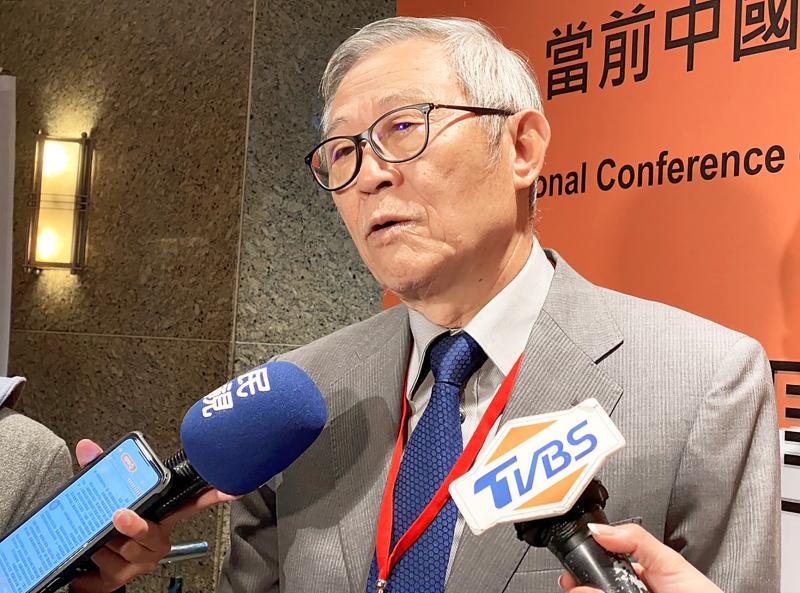Both sides of the Taiwan Strait should extend goodwill to each other to ease cross-strait tensions, China experts in Taiwan said on Sunday.
Their remarks came after President Tsai Ing-wen (蔡英文) reiterated her support for maintaining the “status quo” across the Taiwan Strait in her Double Ten National Day address earlier in the day.
“Our position on cross-strait relations remains the same: Neither our goodwill nor our commitments will change. We call for maintaining the status quo, and we will do our utmost to prevent the status quo from being unilaterally altered,” Tsai said.

Photo: CNA
“I also want to emphasize that resolving cross-strait differences requires the two sides of the Strait to engage in dialogue on the basis of parity,” she added.
Lin Tzu-li (林子立), an associate professor in Tunghai University’s political science department, said that although Tsai emphasized that Taipei would not act rashly, Beijing should stop its military activities near Taiwan to avoid conflict.
It is of great importance for the two sides to extend goodwill to each other to enable more harmonious cross-strait relations as the COVID-19 situation improves, Lin said.
Chao Chun-shan (趙春山), an honorary professor of China studies at Tamkang University, said that Taiwan and China should establish a crisis management mechanism to prevent a lack of cross-strait communication from generating suspicion and conflict.
Chao said that Tsai’s cross-strait policy is “to resist China and protect Taiwan,” while the Chinese Communist Party (CCP) is “anti-Taiwan independence and pro-unification,” showing that each side has different policy positions and goals.
Taiwan is concerned that the CCP’s cross-strait policy could endanger the nation’s survival, while the CCP worries that Taipei’s aim at resisting Beijing would affect China’s commitment to fulfill its two centenary goals, which are the foundation for achieving Chinese President Xi Jinping’s (習近平) “Chinese Dream,” Chao said.
The differences and a lack of communication mean there is distrust between Taiwan and China, which could further fuel an escalation of hostility toward each other, Chao said.
A crisis management mechanism under the Straits Exchange Foundation and China’s Association for Relations Across the Taiwan Straits — which are semi-official bodies responsible for dealing with cross-strait matters in the absence of government-to-government contacts — could address issues of mutual concern, such as trade matters and the sale of COVID-19 vaccines, Chao said.
Chu Chao-hsiang (曲兆祥), a professor at National Taiwan Normal University’s Graduate Institute of Political Science, said that although Tsai said her administration is willing to engage in dialogue with China, it has not yet taken concrete action.
Chu called on Tsai to pursue talks with Beijing on restoring cross-strait exchanges.
Liao Da-chi (廖達琪), a professor of political science at National Sun Yat-sen University, said that a meeting between Tsai and Xi is unlikely.
She added that Tsai’s reaffirmation that the Republic of China and the People’s Republic of China should not be subordinate to each other is in the interest of the US.

Taiwan is to commence mass production of the Tien Kung (天弓, “Sky Bow”) III, IV and V missiles by the second quarter of this year if the legislature approves the government’s NT$1.25 trillion (US$39.78 billion) special defense budget, an official said yesterday. Commenting on condition of anonymity, a defense official with knowledge of the matter said that the advanced systems are expected to provide crucial capabilities against ballistic and cruise missiles for the proposed “T-Dome,” an advanced, multi-layered air defense network. The Tien Kung III is an air defense missile with a maximum interception altitude of 35km. The Tien Kung IV and V

The disruption of 941 flights in and out of Taiwan due to China’s large-scale military exercises was no accident, but rather the result of a “quasi-blockade” used to simulate creating the air and sea routes needed for an amphibious landing, a military expert said. The disruptions occurred on Tuesday and lasted about 10 hours as China conducted live-fire drills in the Taiwan Strait. The Civil Aviation Administration (CAA) said the exercises affected 857 international flights and 84 domestic flights, affecting more than 100,000 travelers. Su Tzu-yun (蘇紫雲), a research fellow at the government-sponsored Institute for National Defense and Security Research, said the air

A strong continental cold air mass is to bring pollutants to Taiwan from tomorrow, the Ministry of Environment said today, as it issued an “orange” air quality alert for most of the country. All of Taiwan except for Hualien and Taitung counties is to be under an “orange” air quality alert tomorrow, indicating air quality that is unhealthy for sensitive groups. In China, areas from Shandong to Shanghai have been enveloped in haze since Saturday, the ministry said in a news release. Yesterday, hourly concentrations of PM2.5 in these areas ranged from 65 to 160 micrograms per cubic meter (mg/m³), and pollutants were

Taiwan lacks effective and cost-efficient armaments to intercept rockets, making the planned “T-Dome” interception system necessary, two experts said on Tuesday. The concerns were raised after China’s military fired two waves of rockets during live-fire drills around Taiwan on Tuesday, part of two-day exercises code-named “Justice Mission 2025.” The first wave involved 17 rockets launched at 9am from Pingtan in China’s Fujian Province, according to Lieutenant General Hsieh Jih-sheng (謝日升) of the Office of the Deputy Chief of the General Staff for Intelligence at the Ministry of National Defense. Those rockets landed 70 nautical miles (129.6km) northeast of Keelung without flying over Taiwan,